
Listening Basics PartIII
.pdf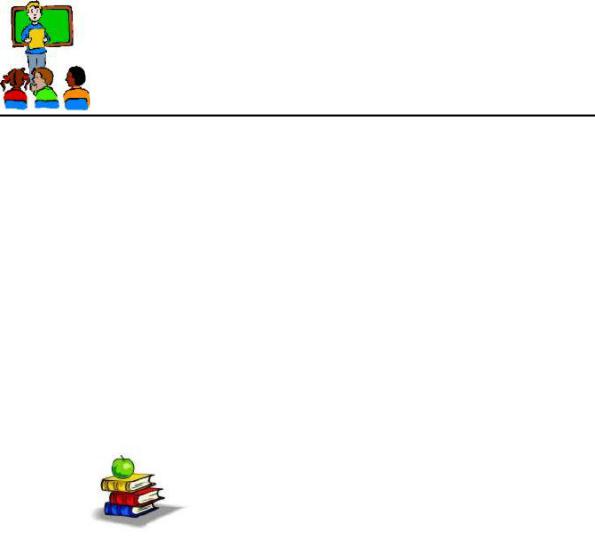
Part II. Lecture
The following lecture is about the Universal Declaration of Human Rights.
1. Preview questions
What are the human rights? Give examples. Give examples of human-rights violations around the world. Have you ever heard of the Universal Declaration of Human Rights? Share what do you know about this document.
2. Words
Read, define and find Russian equivalents for the following words from the lecture:
civil rights - _____________________________________________
(to be) arrested - __________________________________________
to prohibit - _____________________________________________
a slave - ________________________________________________
slavery - ________________________________________________
torture -_________________________________________________
to torture - ______________________________________________
minority groups - _________________________________________
to mistreat - _____________________________________________
51
to abolish - ______________________________________________
to violate - ______________________________________________
a refugee - ______________________________________________
a vision - ________________________________________________
3. Listen to the lecture and fill in the following outline
Listen to the lecture and fill in the following outline
The Universal Declaration of Human Rights
I. Introduction: on December, 10, 1948 all the members of the United Nations passed the Universal Declaration of Human Rights.
II. Description of the Declaration:
A. Declaration is _____________________________________
____________________________________________________________________
B.The structure of the Declaration:
1.It contains: __________________________________
2.Four categories of human rights:
a.First, __________________________________
b.Second, ________________________________
c.Third, _________________________________
d.Fourth, ________________________________
3. ―Civil rights‖ means ____________________________
______________________________________________
For example,
52
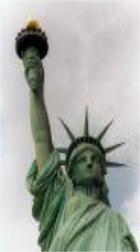
a.freedom of speech is when ___________________
__________________________________________
b.freedom of movement - _____________________
__________________________________________
c.Article 1 says _____________________________
__________________________________________
d.the Declaration prohibits ____________________
__________________________________________
4._____________________ deals with ______________
_______________________________________________
For example,
a.Article 23 states that ______________________
_________________________________________
b.right to equal pay for equal work, i.e. _________
_________________________________________
5.Social rights mainly deals with ___________________
For example,
a.everyone has a right to education
b.parents have a right ______________________
_________________________________________
6.____________________________________________
For example,
people have the right to participate in __________
_________________________________________
C.Significance of the document
53
1.For the first time in the history it contains ___________
_______________________________________________
2.The Declaration gives United Nations the power to ___
_______________________________________________
For example,
In 1991, South Africa _______________________
_________________________________________
III.Examples of the human rights violations:
A.More than a _______________________________________
B.More than 16 million people are _______________________
C.At least 30 wars ___________________________________
D._________________________________________________
E.There are countries in which women and children _________
___________________________________________________
IV. Conclusion: human rights violations are not far away
A.Discrimination and violence, esp. against _______________
B._________________________________________________
C.The Universal Declaration of Human Rights provides people with _____________________________________________
4.Answer the questions about the lecture
a.What is the Universal Declaration of Human Rights? When was it passed?
b.Give examples of human rights in each of the following categories:
54
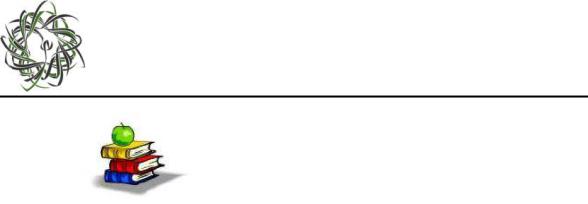
civil and political rights; economic rights; social rights;
cultural rights.
c.How do you, personally, benefit from each of the rights listed in this lecture? How would your life be different if you didn't have these rights?
d.If someone is arrested, what rights should they have? For example, should they be allowed to speak to a lawyer?
e.Did you ever have slavery in your country's history? If yes, when was it abolished?
f.How are minority groups treated around the world? In general, do they have the same civil rights as people in the majority?
5. Listen to the lecture once again and write out sentences with the active vocabulary (Ex. 2)
Listen to the lecture once again and write out sentences with the active vocabulary (Ex. 2)
6. Retell the lecture
Part III. Making Inferences
1. Words
Make sure you know the following words from the dialog:
capital punishment
55
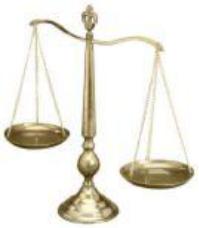
(death) penalty execution
to prevent
a disabled person to be opposed to to hurt
to fire smb a wheelchair deafness
2. You are going to hear five short talks. After each talk, you will hear a question. Read the answer choices and circle the letter of the best answer.
You are going to hear five short talks. After each talk, you will hear a question. Read the answer choices and circle the letter of the best answer.
1.
a.Employers and workers have different ideas about e-mail privacy.
b.Companies that check workers' e-mail are breaking the law.
c.Most companies don't believe in freedom of speech.
d.40% of American companies have e-mail.
2.
a.More than half the countries in the world no longer practice capital punishment.
b.Death is the punishment for all major crimes in the United States.
56
c.Research proves that the existence of the death penalty helps to prevent crime.
d.In the year 2000, 108 people were executed in the United States.
3.
a.Children who work will receive higher pay.
b.More and more children will work in industrialized countries.
c.Fewer children will work.
d.Factory work will become less dangerous.
4.
a.Most Americans are vegetarians.
b.Animals have the same rights as people in the United States.
c.Many Americans are opposed to violence against animals.
d.Animals are always hurt in the production of movies.
5.
a.It is almost impossible for a disabled person to find a job.
b.It is illegal to fire a person with AIDS from a job.
c.50 million Americans use wheelchairs.
d.There are more people with disabilities in America than in other countries.
57
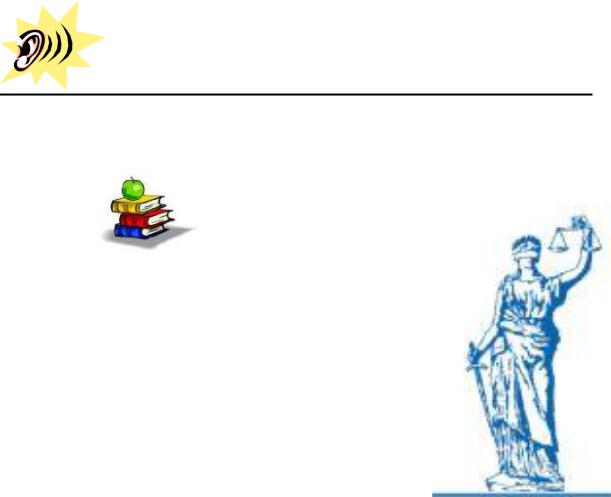
Part IV. Expanding the Topic
1. Suffering Discrimination
A. Words
Make sure you know the following words: Names: Hispanics, Oceania, Afghanistan a refugee
college graduation rate natural disaster
to displace an attainment
B.Discuss the following questions.
1.What percentage of women work in your community? What kinds of jobs do they usually have? How much are they paid, compared to men?
2.In every country, some groups (ethnic, economic, religious, or national) get a better education than others. Why do you think this occurs?
3.What is a refugee? Where do refugees come from?
4.Look at the incomplete graphs in the next activity. Read the titles. What information does each graph contain?
58
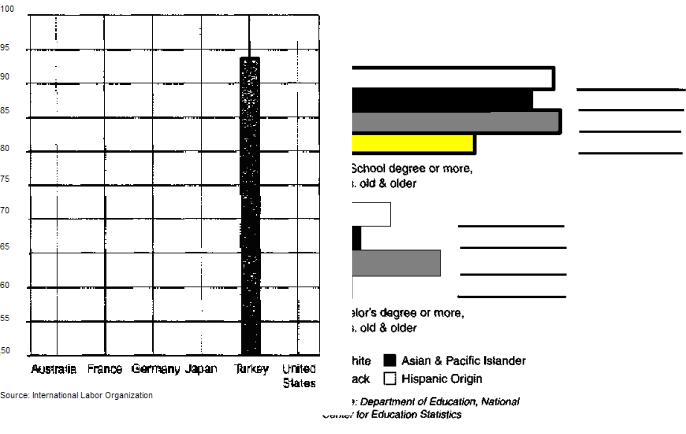
C. You will hear statistical information about three groups that have suffered or suffering from discrimination today: women, minority groups in the United States, and refugees. Listen to the speaker and complete the following graphs.
You will hear statistical information about three groups that have suffered or suffering from discrimination today: women, minority groups in the United States, and refugees. Listen to the speaker and complete the following graphs.
1. Women‘s Earning as a Percentage of Men‘s 2. Difference in Educational Attainment by Race and
Age
59
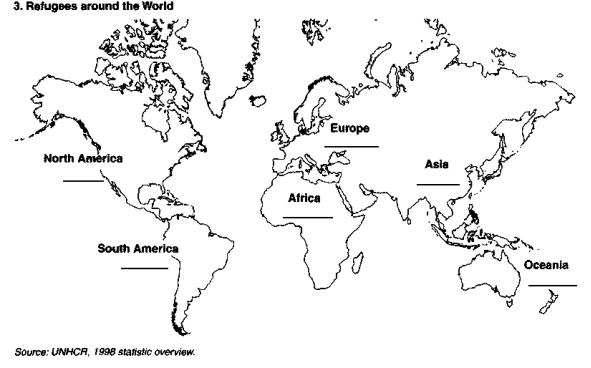
3. Refugees around the World
2. Clinton Speaks at Rosa Park’s Funeral
 Listen to a piece of news on Voice of America News, November 2, 2005, and fill in the gaps.
Listen to a piece of news on Voice of America News, November 2, 2005, and fill in the gaps.
Former President ____________ has delivered remarks in
Detroit, Michigan, at Wednesday‘s funeral services for U.S. civil rights ____________ Rosa Parks.
Mr. Clinton said a _____________ act by Mrs. Parks struck a lethal blow to legalized bigotry, and ignited the most significant
_________________ ___________________ in American history. Senators ___________ Clinton, John Kerry and Barack Obama,
civil rights leader Jesse Jackson and _____________ Aretha Franklin are among the large number of political ________________ and
60
